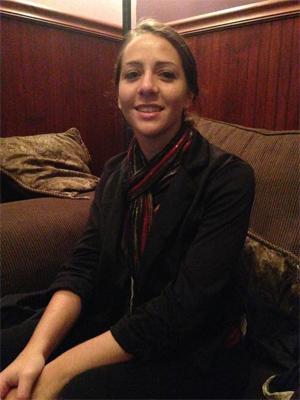Because of the recent drilling boom, property owners may find it important to understand the status of their own interests in the minerals beneath their homes. Ohio University student Alena Klimas recently had the opportunity to work with a law firm that seeks to determine historical lines of ownership in order to ease law suits related to mineral rights.
Klimas is a sophomore studying Political Science and Global Studies: War and Peace and a member of Students for Law, Justice & Culture, which is the student group affiliated with the Ohio University Center for Law, Justice & Culture.
For two months this summer, Klimas interned with the Parkersburg, WV, law firm Bowles Rice, which works around the region in more than 30 areas of practice, including health care law, tax law, and environmental and regulatory law. Specifically, Klimas worked on a process called “abstracting” with a department focusing on mineral rights.
“Oil companies, the state or even families who own the land, can sue for property rights, and abstracting is then your defense,” Klimas explained.
Abstracting is the process of tracing ownership of rights, such as property or mineral rights, through historical legal documents. Mineral rights determine who controls valuable minerals underground. Often, the ownership of mineral rights and property rights separate at some point in the legal record, due to either owners selling mineral rights while retaining property rights or holding onto mineral rights while selling the above-ground property.
“Most of the time, especially in West Virginia, the people who live on the land don’t own under the land,” Klimas added.
She worked alongside the abstracting department to find documents that were relevant to the case. Some days, this meant driving an hour away to the Doddridge County courthouse in West Union, WV, to track down and scan legal documents dating back to as early as 1850 and covered in cursive scrawl. On other days, she worked with databases to find and read wills, court records and other documents.
“It gets really crazy,” she laughed. “With mineral rights, everyone gives them to their grandchildren, and their children give them to their grandchildren.” She explained that oftentimes individuals would hold maybe 1/24 mineral rights ownership of an area of land, and she had seen as low as 1/1000 of the rights. These trends complicate the process of abstracting.
For the most part, Klimas worked on request by companies and families seeking to preemptively determine their mineral rights. Sometimes there were cases in the process of being settled out of court between families and drilling companies. Ultimately, the goal was to avoid the necessity of going to court when ownership might be disputed.
‘It Was a New Perspective on the Law’
Klimas recommends other students interested in law to try to learn to abstract, because it is a high-demand skill. For example, she said, she would be interested in working in California, where property rights have recently become an important issue.
“It was a new perspective on the law,” she said. “When most people think of law, they think of courtrooms and criminal cases. It was good to see a different side of it that wasn’t dramatic like a movie. It’s really going through history and seeing where legal documents transfer and knowing all the laws to be able to understand whose property it is.”
But generally, Klimas said she believes one of the best results of this internship was the chance to learn something new. “Don’t be scared to try something that you don’t necessarily see yourself doing,” she advised. “It opens doors you might not have thought would be open or that you’d want to be open. See as much as you can.”




















Comments